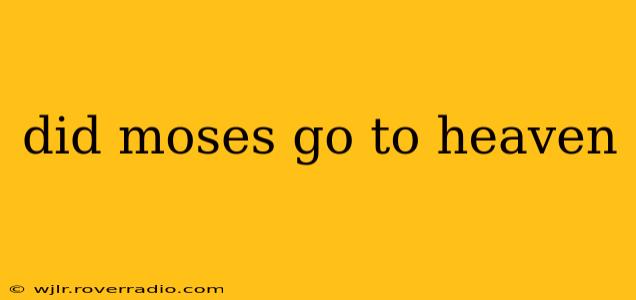The question of whether Moses went to heaven is a complex one, lacking a definitive answer within the Bible. Different theological perspectives and interpretations of scripture lead to varying conclusions. This exploration delves into the biblical accounts and various theological viewpoints to provide a comprehensive understanding of this enduring question.
What Does the Bible Say About Moses' Death and Afterlife?
The Bible describes Moses' death in Deuteronomy 34:5-7: "So Moses the servant of the Lord died there in the land of Moab, as the Lord had said. And he buried him in the valley in the land of Moab, opposite Beth-peor; but no one knows his burial place to this day. Moses was one hundred and twenty years old when he died; his eye was not dim, nor his natural force abated." This passage notably omits any mention of Moses' ascension to heaven or any other form of afterlife explicitly described in other biblical accounts of significant figures. The lack of detail surrounding his death and burial fuels ongoing debate.
Did Moses See God Face to Face? Does This Imply Heavenly Ascent?
The Bible recounts several instances where Moses interacted directly with God, most famously on Mount Sinai. Exodus 33:11 states, "Thus the Lord used to speak to Moses face to face, as a man speaks to his friend." This intimate relationship with God often leads to speculation about Moses' spiritual destiny. However, this close connection, while significant, doesn't automatically imply heavenly ascension after death. Many interpret this “face-to-face” communication as a metaphor for a particularly close and clear understanding of God's will, rather than a literal face-to-face meeting in a heavenly realm.
What is the Jewish Perspective on Moses' Afterlife?
Jewish tradition doesn't offer a uniform answer to whether Moses went to heaven. Some interpretations focus on the text's ambiguity, emphasizing the mystery surrounding his death and burial as a symbol of his unique relationship with God. Others suggest that Moses, like other righteous individuals, will be resurrected at the end of time, but not necessarily directly ascended to a specific heavenly realm in the immediate aftermath of his death. The focus is less on a specific afterlife location and more on the enduring legacy and influence of Moses' life and teachings.
What is the Christian Perspective on Moses' Afterlife?
Christian perspectives vary as well. Some argue that as a righteous individual, Moses enjoyed a blessed afterlife in the presence of God. Others may point to the broader Christian doctrine of salvation and resurrection, suggesting that Moses' ultimate destiny rests within this framework. However, there's no explicit biblical passage directly addressing Moses' post-death experiences. Therefore, beliefs tend to be extrapolations based on broader theological interpretations of the afterlife.
What About Other Figures in the Bible – Did They Go to Heaven?
The Bible doesn’t explicitly detail the afterlife experiences of most figures, contributing to the ambiguity surrounding Moses' fate. While some may interpret certain accounts allegorically, suggesting heavenly ascent, the Bible focuses primarily on earthly actions, leaving ultimate destinies open to interpretation. This lack of explicit detail underscores the ongoing theological discussions concerning the nature of the afterlife itself.
Conclusion: The Ambiguity Persists
The question of whether Moses went to heaven ultimately remains unanswered definitively within the Bible. Different theological interpretations and the lack of specific details surrounding his death and burial contribute to the ongoing debate. The ambiguity itself may be seen as a testament to the mystery surrounding the afterlife and the enduring power of Moses' story and its interpretations across various faiths and beliefs.
